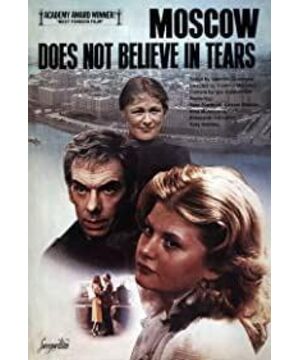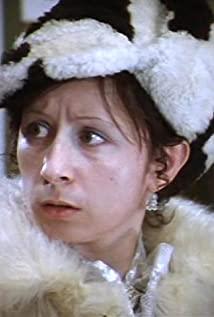1. What was said before
I believe that there is a kind of "Soviet complex" in the hearts of many older generation in China. They have accepted too much Soviet culture in their growth and youth, so they will inevitably feel close to it, just like the so-called "mother's" It tastes the same, growing up eating my mother's food, although it may not be very delicious, it is still nostalgic. But this kind of complex is getting farther and farther away from us. It is far less profound and heavy than it was in the past. In the face of this bizarre world, we will have many more choices than the previous generation. When some of them want to stop and look back It is difficult to reach out to touch and feel the unique feelings and culture infused by the parents.
Now after watching "Moscow Does Not Believe in Tears", I can't say how much resonance it has for the vicissitudes of the years, and I can't say how much the life and ideals of the previous generation can be understood through this film, but I hear the music of the quality of the record. When I sang "Alixandra" repeatedly in the ending song, I really got goosebumps. Although I wasn't born in that era, such tunes and lyrics were unique to that era. Perhaps you can taste the slightest traces from it.
I once thought of commenting on this film from a more professional perspective, but I don't know much about the actors, directors, and costumes, and I only know a little about the way the film was shot. Due to the lack of relevant knowledge, I thought that it would be better to write down my most authentic experience than to fiddle with it. Watching a movie is a personal activity, and it follows one's own experience. I think, even if this review of my movie is bland, even if I am a "Penghao person" at this time, I will still "go out with a big laugh".
2. Timeless "tears"
Emotional tears in humans contain a chemical similar to painkillers. I once heard my psychology teacher say that such tears can take away some of the negative emotions in people's hearts. "Moscow Doesn't Believe in Tears" is not a tear from the corner of the city's eye - its crystal clear, round and lustrous appearance can reflect the secular human feelings and life in Moscow, and at the same time, it also has a profound practical significance, giving the viewers To inspire, dispel the haze in some people's hearts.
"Moscow Does Not Believe in Tears" was filmed in the late 1970s, a time when Soviet cinema was very different from previous films. In the 1960s, Soviet films made up the majority of war-themed works. In addition, there were also works on agriculture and rural class struggle. However, in the 1970s, there were four major creative crazes in Soviet films: political themes and military patriotism. , production themes and moral themes emerge in an endless stream. "Moscow Does Not Believe in Tears" obviously does not belong to military patriotism and production themes, and although it reflects real life, it does not have a strong political meaning. I also believe that the director did not aim to highlight politics, so it should be a film Movies about morality. It truly and profoundly reflects the contradictions existing in the Soviet society, reflects the conflicts between individuals, families and groups, and depicts the psychological state and spiritual outlook of people in the real environment. The film starts with shaping a positive protagonist, reflecting the development of Soviet society and its existing problems.
It can be seen that "Moscow Does Not Believe in Tears" is the usual theme of love and life in today's films, but it was groundbreaking at that time, and "Film Review" magazine once commented on it: ""Moscow Does Not Believe in Tears" is a 20th century The Soviet works that subverted traditions in the 1970s, the film got rid of the rules and regulations of previous films. It neither described war nor taught people how to reclaim land, and certainly not praised the great achievements of astronauts. Instead, it aimed at the ordinary residents of Moscow and recorded Their joys, sorrows and sorrows.” It is precisely because of this that the modernity of its theme also makes the film still relevant today. I thought the film played down the ideology to a certain extent. Although it still presents political information such as national policies, it is not abrupt, as if everything is so natural, everything is reasonable, and everything is for the development of the plot. What should be needed - the typical environment it creates and the typical characters it creates can give people a natural sense of substitution. And this just played the role of "abstraction". The viewers can not only immerse themselves in the special era and feel the life of the people at that time, but also strip them out and interpret them as the spiritual symbols they need, and let them suggest themselves. - We must live strong, solid lives. In addition, its light and humorous light comedy effect increases the interest and observability, making the film's inspirational applicability to viewers wide range.
Therefore, "Moscow Does Not Believe in Tears" is not out of date. "Tears" is not out of date.
3. "Life begins at the age of forty" - women's pursuit of self-awareness and value
If the film is regarded as an article, then "life begins at forty" is its central sentence.
Plato believed that man is composed of body and soul, but because man was "shocked" when he was born, his soul was more or less lost, so man needs to make efforts in the day after tomorrow to "get it back" through education and so on. lost soul.
And the truth told in the film is similar to it - "life begins at the age of forty" means - although from birth, we have had direct contact with society, but at the beginning of life, we are always confused , There is too much ignorance and ignorance about the world, just like Katerina was infatuated with Rudolph at first, worshipping the new career of TV photographer and then being deceived by him. So, we miss a lot of good things. However, we can't lose confidence in this. A good life is not about crying. We need to work hard and struggle, so that we will continue to gain what we lost and missed at the beginning, and we will become more and more clear about our own positioning. And happiness will come inadvertently. When you think that life is a foregone conclusion and there will be no more waves, fate gives you a surprise and lets life really begin - and these are what you deserve.
In fact, "life begins at the age of forty" is growth, the process of finding self-awareness and value.
I don't know if it's because the director thinks that women's emotions are softer and more delicate, and they will have many different choices in life, so they cut into life from the perspective of women, and conveyed this truth to people through their lives. In any case, in my opinion, "Moscow Does Not Believe in Tears" is a very typical female upbringing film - the film starts with a group dormitory for female workers, and we soon find three in the same dormitory. Young girls each have different personality traits, which also shows their different views on love and life.
But these three girls are growing up, and everyone has gained the maturity and quietness that has been baptized over the years, especially the protagonist Katerina. From the beginning to the end of the film, it can be seen as the embodiment of her pursuit of self-awareness and value—— Katerina unfortunately failed the college entrance examination. Unwilling, she stayed in Moscow as a worker and continued to prepare for the exam. By chance, she pretended to be the daughter of a professor and met Rudolph, a photographer on the radio station, and then she was not tempted by Rudolph and devoted herself to him. However, after the powerful Rudolph knew the truth, he abandoned the pregnant Katerina. But strong, she gave birth to a daughter and raised her alone. The middle-aged Katerina became famous and became the director of the factory. She, who was already at peace, accidentally met Gesha. The two people with similar experiences cherished each other. Although there were many ups and downs, Katerina and Gesha finally came together.
The heroine's growth is not brought about by time itself, but her firm belief and tenacious spirit during those years supported her to move forward.
In order to express "the pursuit of self-awareness and value", the film uses a lot of contrasting shots - this is the general style of its narrative. I thought that the "forty years" of the characters in the film (that is, middle-aged, because according to the calculation, the age of the main characters in sixteen years is about thirty-five or sixteen years old) as the dividing line, and the sixteen years ago and the Compare life sixteen years later. Moreover, many of these comparison shots are closely related to "tears". Here are two examples of them:
(1) Lyudmila's tears of guilt
Although Lyudmila is a hedonist who pursues material life, her feelings for Katerina are real. When she knew that it was also a deception, she got the opportunity to marry Gu Lin, but Katerina was not. When she was abandoned, she felt extremely apologetic in her heart. She cried and wanted to ask for Katerina's forgiveness.
Sixteen years later, Gu Lin, who did not drink alcohol, was destroyed by alcohol, and Lyudmila divorced.
(2) Katerina's tears of regret
This pair of contrast shots can be said to be very typical: sixteen years ago, on a bench in Gogol Street, the brightly dressed Rudolph indifferently parted with the plain and pregnant Katerina. Linna regretted her deceit and wept for the disappointment of the snobby man; sixteen years later, Katerina was dressed elegantly, her beautiful face honed by the years gleaming calm but powerful. Light, on the same bench, she quietly defeated the Rudolph who hurt her with confidence and a strong heart, the man whose life was not going well and his face was full of embarrassment.
A happy beginning may have a disappointing result, a not-so-good beginning may usher in a bright future, and of course life may, like Antonina's, be as peaceful and natural as ever.
It is gratifying that they did not lose their initial friendship, innocence and hope in the process of growing up. It is a blessing for Katerina to have such two friends with her. And I think, at the end of the film, the three women cry together at Katerina's house, probably to show that friendship is sometimes a warm bed for people to escape and vent for a short time - it is Katerina's retreat , Even if Moscow does not believe in tears, at least two people do! On the road of growth in search of "self", there is always a harbor where you can take off your guard!
At the same time, Katerina's pursuit of self-awareness and value reminds me of another movie "Mona Lisa's Smile". The story takes place in a women's college, so it is often divided into educational works. But the teacher Katherine and the female students in the girls' school are not the "intellectual" version of Katerina and others. They also cried, but after the tears, the brave and strong ones finally broke through the fetters they set for themselves. The two films coincide with each other in that they reflect the search for "self" by women of a certain age.
Let's talk about Gosha. Gosha is not just a man who suddenly broke into Katerina's life. I personally think that he is also the incarnation of the "self" that Katerina is struggling to find. Because what Gosha sees with her eyes is her most simple, original but also the most difficult to be discovered and realized "self". That's why when her daughter asked Katerina what Gosha saw her as, Katerina said, "See me as a woman." "Woman" - this is an identity that has thrown away layers of social status and taken off the mask of role-playing. Gosha symbolizes Katerina's true "self". The two have similar experiences, and the further back they go, the more suitable they exude. How can we not say that Gosha is Katerina's "self" mirror reflection?
"Life begins at forty" sounds absurd to a teenage girl, no wonder Katerina can't believe it at first. But to those who come, it is as much a lyric poem summarizing life as a line, as well as a serenade to encourage and admonish young people. We don't know what happened to the famous gentleman who said this in the movie, but when these young and ignorant girls sang together on the front steps of Antonina's house sixteen years later, everything suddenly became clear.
And young us, probably also need to slowly experience and precipitation.
5. Say goodbye to tears
Having said so much, in the final analysis, I think what the film wants us viewers to understand is: say goodbye to tears and live strong in the world - strong, a very common word, but it is very difficult to really do it. Our young people are very good at "lying", and some good qualities are often reduced to empty slogans. For example, "strong" is often seen in the article. This made it difficult for many young people to believe, so they began to make various jokes-for example, many people commented that the truth revealed by "Moscow Does Not Believe in Tears" is too mediocre and boring.
I definitely disagree with the above assessment. Katerina was ignorant and confused. She was painful and disappointed, but she never gave up. How long has it been?" We know she is saying goodbye to tears.
Growth is a process of saying goodbye to tears.
Of course, not believing in tears does not mean you can't have tears. When you encounter setbacks in life, the natural psychological reaction is anger, sadness, disappointment, etc., while the most common physiological natural reaction is tears. Tears are a shield for human beings to face life - but a person can't just cry blindly, we are not the center of the world, we are just ordinary individuals, in this fast-changing society and even the law of the weak, weeping alone It is irrational to seek sympathy. And "Moscow Does Not Believe in Tears" just wants to tell us that after weeping, we need to clearly realize that only by raising our heads, giving life a little confidence, and walking down solidly, can we reap the possibility of happiness!
Saying goodbye to tears doesn't mean that everyone has to be so hard-hearted that they won't shed a single tear, but we don't want so many meaningless tears in our lives.
"Stop crying, Moscow doesn't believe in tears, it's not time to cry! It's time to act!"
That's right, it's time to act! It's time to say goodbye to those meaningless tears!
View more about Moscow Does Not Believe in Tears reviews








